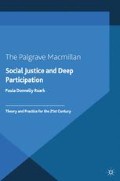Abstract
Given the inquiry into deep participation, its six elements, and the illustrative case studies, we now begin to have a sense of its inherent complexity. There is also little understanding of participatory dynamics by social theorists, and even participation practitioners, in the context of rapid social change. As a result, there is only minimal support for theorists in their efforts to develop a participatory social theory or for practitioners in their efforts to assist communities in achieving their aspirations in this situation. The intent here, then, is to begin a theoretical discussion on what this category of theory should include. My contribution here in defining deep participation in the context of rapid social change and then offering a beginning formulation of this new theory is a modest one in terms of the large amount of work required to complete the task. But it does provide a substantial starting point upon which participatory social theory can be developed in full.
Access this chapter
Tax calculation will be finalised at checkout
Purchases are for personal use only
Preview
Unable to display preview. Download preview PDF.
Notes
WorldCat, an online worldwide catalog now lists much of this literature. Also, several of these authors have also been included in Andrea Cornwall’s (2011) recently published edited volume, Participation Reader (London: Zed Books).
Claude Levi-Strauss (1963), Structural Anthropology (New York: Basic Books), p. 335.
Immanuel Wallerstein (2004), “New Revolts against the System”, in Tom Mertes, ed., A Movement of Movements: Is Another World Really Possible? (London: Verso), pp. 262–274;
and Immanuel Wallerstein (1999), The End of the World as We Know It (Minneapolis: University of Minnesota Press).
See, for example, Achille Mbembe (2001), On the postcolony (Berkeley: University of California Press).
Raewyn Connell (2007), Southern Theory (Cambridge, UK: Polity), pp. 44–46.
James Ferguson (2006), Global Shadows: Africa in the Neoliberal World Order (Durham, NC: Duke University Press), pp. 3–7.
Bruce Kapferer, ed. (2007), Retreat of the Social: The Rise and Rise of Reductionism (New York, Oxford, UK: Berghahn Books), p. 1.
Mary Douglas (1986), How Institutions Think (Syracuse, NY: Syracuse University Press), p. 53.
Copyright information
© 2015 Paula Donnelly Roark
About this chapter
Cite this chapter
Roark, P.D. (2015). Stalemate or Reinvention?. In: Social Justice and Deep Participation. Palgrave Macmillan, London. https://doi.org/10.1057/9781137436870_9
Download citation
DOI: https://doi.org/10.1057/9781137436870_9
Publisher Name: Palgrave Macmillan, London
Print ISBN: 978-1-349-49366-1
Online ISBN: 978-1-137-43687-0
eBook Packages: Palgrave Intern. Relations & Development CollectionPolitical Science and International Studies (R0)

